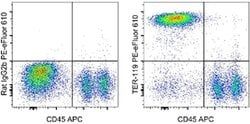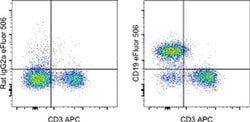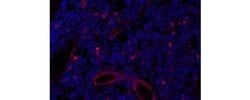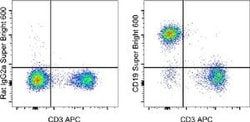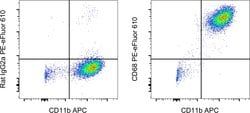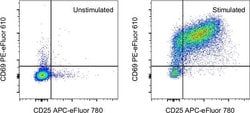61-068-182
CD68 Monoclonal Antibody (FA-11), PE-eFluor™ 610, eBioscience™, Invitrogen™
Manufacturer: Invitrogen
Select a Size
| Pack Size | SKU | Availability | Price |
|---|---|---|---|
| Each of 1 | 61-068-182-Each-of-1 | In Stock | ₹ 38,537.00 |
61-068-182 - Each of 1
In Stock
Quantity
1
Base Price: ₹ 38,537.00
GST (18%): ₹ 6,936.66
Total Price: ₹ 45,473.66
Antigen
CD68
Classification
Monoclonal
Concentration
0.2 mg/mL
Formulation
PBS with 0.09% sodium azide, pH 7.2
Gene Accession No.
P31996
Gene Symbols
Cd68
Purification Method
Affinity chromatography
Regulatory Status
RUO
Gene ID (Entrez)
12514
Content And Storage
4° C, store in dark, DO NOT FREEZE!
Form
Liquid
Applications
Flow Cytometry
Clone
FA-11
Conjugate
PE-eFluor 610
Gene
Cd68
Gene Alias
CD68, CD68 antigen, CD68 molecule, GP110, Lamp4, macrophage antigen CD68, macrosialin, Scard1, scavenger receptor class D, member 1, similar to CD68 antigen
Host Species
Rat
Quantity
100 μg
Primary or Secondary
Primary
Target Species
Mouse
Product Type
Antibody
Isotype
IgG2a κ
Description
- Description: This FA-11 monoclonal antibody reacts with mouse CD68, known also as macrosialin
- CD68 is a heavily O- and N- glycosylated type I integral membrane protein belonging to the sialomucin family and is closely related to the Lysosomal/endosomal-Associated Membrane Glycoproteins (LAMP)
- Although commonly used as a pan-macrophage marker, low levels of expression have also been observed in Langerhans cells and conventional dendritic cells
- CD68 is mostly localized in the late endosomes and lysosomes with a smaller fraction circulating to the cell surface
- In the steady state, only about 10-15% of CD68 is present at the surface
- Cell stimulation increases expression of CD68, its transport to cell surface, and results in glycoform remodeling
- CD68 binds oxidized LDL and is involved in the process of phagocytosis
- Applications Reported: This FA-11 antibody has been reported for use in intracellular staining followed by flow cytometric analysis
- Applications Tested: This FA-11 antibody has been tested by intracellular staining followed by flow cytometric analysis of mouse bone marrow-derived macrophages using the Intracellular Fixation & Permeabilization Buffer Set (Product No
- 88-8824-00) and protocol
- Please refer to Staining Intracellular Antigens for Flow Cytometry, Protocol A: Two step protocol for intracellular (cytoplasmic) proteins located under the Resources Tab online
- This may be used at less than or equal to 1.0 μg per test
- CD68 (Macrosialin) is a 110 kDa integral membrane glycoprotein predominantly expressed on the intracellular lysomsomes of monocytes and macrophages and to a lesser extent by dendritic cells and peripheral blood granulocytes
- Also, CD68 could play a role in phagocytic activities of tissue macrophages, both in intracellular lysosomal metabolism and extracellular cell-cell and cell-pathogen interactions
- CD68 is expressed by interdigitating reticulum cells in tonsil and some histiocytic lymphoma or histiocytosis, acute myeloid leukemia (AML), and granulocytic sarcoma
- Elevated expression of CD68 has been demonstrated on CD34+ cells in various human malignancies, including several Acute Myeloid Leukemia studies.
Compare Similar Items
Show Difference
Antigen: CD68
Classification: Monoclonal
Concentration: 0.2 mg/mL
Formulation: PBS with 0.09% sodium azide, pH 7.2
Gene Accession No.: P31996
Gene Symbols: Cd68
Purification Method: Affinity chromatography
Regulatory Status: RUO
Gene ID (Entrez): 12514
Content And Storage: 4° C, store in dark, DO NOT FREEZE!
Form: Liquid
Applications: Flow Cytometry
Clone: FA-11
Conjugate: PE-eFluor 610
Gene: Cd68
Gene Alias: CD68, CD68 antigen, CD68 molecule, GP110, Lamp4, macrophage antigen CD68, macrosialin, Scard1, scavenger receptor class D, member 1, similar to CD68 antigen
Host Species: Rat
Quantity: 100 μg
Primary or Secondary: Primary
Target Species: Mouse
Product Type: Antibody
Isotype: IgG2a κ
Antigen:
CD68
Classification:
Monoclonal
Concentration:
0.2 mg/mL
Formulation:
PBS with 0.09% sodium azide, pH 7.2
Gene Accession No.:
P31996
Gene Symbols:
Cd68
Purification Method:
Affinity chromatography
Regulatory Status:
RUO
Gene ID (Entrez):
12514
Content And Storage:
4° C, store in dark, DO NOT FREEZE!
Form:
Liquid
Applications:
Flow Cytometry
Clone:
FA-11
Conjugate:
PE-eFluor 610
Gene:
Cd68
Gene Alias:
CD68, CD68 antigen, CD68 molecule, GP110, Lamp4, macrophage antigen CD68, macrosialin, Scard1, scavenger receptor class D, member 1, similar to CD68 antigen
Host Species:
Rat
Quantity:
100 μg
Primary or Secondary:
Primary
Target Species:
Mouse
Product Type:
Antibody
Isotype:
IgG2a κ
Antigen: CD69
Classification: Monoclonal
Concentration: 0.2 mg/mL
Formulation: PBS with 0.09% sodium azide; pH 7.2
Gene Accession No.: P37217
Gene Symbols: CD69
Purification Method: Affinity chromatography
Regulatory Status: RUO
Gene ID (Entrez): 12515
Content And Storage: 4° C, store in dark, DO NOT FREEZE!
Form: Liquid
Applications: Flow Cytometry
Clone: H1.2F3
Conjugate: PE-eFluor 610
Gene: CD69
Gene Alias: 5830438K24Rik; Activation inducer molecule; activation inducer molecule (AIM/CD69); AI452015; AIM; BL-AC/P26; CD69; CD69 antigen; CD69 antigen (p60, early T-cell activation antigen); CD69 molecule; CLEC2C; C-type lectin domain family 2 member C; C-type lectin domain family 2, member C; EA1; early activation antigen CD69; early lymphocyte activation antigen; early T-cell activation antigen p60; GP32/28; leukocyte surface antigen Leu-23; MLR-3; VEA; Very Early Activation Antigen
Host Species: Armenian Hamster
Quantity: 25 μg
Primary or Secondary: Primary
Target Species: Mouse
Product Type: Antibody
Isotype: IgG
Antigen:
CD69
Classification:
Monoclonal
Concentration:
0.2 mg/mL
Formulation:
PBS with 0.09% sodium azide; pH 7.2
Gene Accession No.:
P37217
Gene Symbols:
CD69
Purification Method:
Affinity chromatography
Regulatory Status:
RUO
Gene ID (Entrez):
12515
Content And Storage:
4° C, store in dark, DO NOT FREEZE!
Form:
Liquid
Applications:
Flow Cytometry
Clone:
H1.2F3
Conjugate:
PE-eFluor 610
Gene:
CD69
Gene Alias:
5830438K24Rik; Activation inducer molecule; activation inducer molecule (AIM/CD69); AI452015; AIM; BL-AC/P26; CD69; CD69 antigen; CD69 antigen (p60, early T-cell activation antigen); CD69 molecule; CLEC2C; C-type lectin domain family 2 member C; C-type lectin domain family 2, member C; EA1; early activation antigen CD69; early lymphocyte activation antigen; early T-cell activation antigen p60; GP32/28; leukocyte surface antigen Leu-23; MLR-3; VEA; Very Early Activation Antigen
Host Species:
Armenian Hamster
Quantity:
25 μg
Primary or Secondary:
Primary
Target Species:
Mouse
Product Type:
Antibody
Isotype:
IgG
Antigen: CD69
Classification: Monoclonal
Concentration: 0.2 mg/mL
Formulation: PBS with 0.09% sodium azide; pH 7.2
Gene Accession No.: P37217
Gene Symbols: CD69
Purification Method: Affinity chromatography
Regulatory Status: RUO
Gene ID (Entrez): 12515
Content And Storage: 4° C, store in dark, DO NOT FREEZE!
Form: Liquid
Applications: Flow Cytometry
Clone: H1.2F3
Conjugate: PE-eFluor 610
Gene: CD69
Gene Alias: 5830438K24Rik; Activation inducer molecule; activation inducer molecule (AIM/CD69); AI452015; AIM; BL-AC/P26; CD69; CD69 antigen; CD69 antigen (p60, early T-cell activation antigen); CD69 molecule; CLEC2C; C-type lectin domain family 2 member C; C-type lectin domain family 2, member C; EA1; early activation antigen CD69; early lymphocyte activation antigen; early T-cell activation antigen p60; GP32/28; leukocyte surface antigen Leu-23; MLR-3; VEA; Very Early Activation Antigen
Host Species: Armenian Hamster
Quantity: 100 μg
Primary or Secondary: Primary
Target Species: Mouse
Product Type: Antibody
Isotype: IgG
Antigen:
CD69
Classification:
Monoclonal
Concentration:
0.2 mg/mL
Formulation:
PBS with 0.09% sodium azide; pH 7.2
Gene Accession No.:
P37217
Gene Symbols:
CD69
Purification Method:
Affinity chromatography
Regulatory Status:
RUO
Gene ID (Entrez):
12515
Content And Storage:
4° C, store in dark, DO NOT FREEZE!
Form:
Liquid
Applications:
Flow Cytometry
Clone:
H1.2F3
Conjugate:
PE-eFluor 610
Gene:
CD69
Gene Alias:
5830438K24Rik; Activation inducer molecule; activation inducer molecule (AIM/CD69); AI452015; AIM; BL-AC/P26; CD69; CD69 antigen; CD69 antigen (p60, early T-cell activation antigen); CD69 molecule; CLEC2C; C-type lectin domain family 2 member C; C-type lectin domain family 2, member C; EA1; early activation antigen CD69; early lymphocyte activation antigen; early T-cell activation antigen p60; GP32/28; leukocyte surface antigen Leu-23; MLR-3; VEA; Very Early Activation Antigen
Host Species:
Armenian Hamster
Quantity:
100 μg
Primary or Secondary:
Primary
Target Species:
Mouse
Product Type:
Antibody
Isotype:
IgG
Antigen: CD69
Classification: Monoclonal
Concentration: 5 μL/Test
Formulation: PBS with 0.2% BSA and 0.09% sodium azide, pH 7.2
Gene Accession No.: Q07108
Gene Symbols: CD69
Purification Method: Affinity chromatography
Regulatory Status: RUO
Gene ID (Entrez): 969
Content And Storage: 4° C, store in dark, DO NOT FREEZE!
Form: Liquid
Applications: Flow Cytometry
Clone: FN50
Conjugate: PE-eFluor 610
Gene: CD69
Gene Alias: 5830438K24Rik, Activation inducer molecule, activation inducer molecule (AIM/CD69), AI452015, AIM, BL-AC/P26, CD69, CD69 antigen, CD69 antigen (p60, early T-cell activation antigen), CD69 molecule, CLEC2C, C-type lectin domain family 2 member C, C-type lectin domain family 2, member C, EA1, early activation antigen CD69, early lymphocyte activation antigen, early T-cell activation antigen p60, GP32/28, leukocyte surface antigen Leu-23, MLR-3, VEA, Very Early Activation Antigen
Host Species: Mouse
Quantity: 100 Tests
Primary or Secondary: Primary
Target Species: Human
Product Type: Antibody
Isotype: IgG1 κ
Antigen:
CD69
Classification:
Monoclonal
Concentration:
5 μL/Test
Formulation:
PBS with 0.2% BSA and 0.09% sodium azide, pH 7.2
Gene Accession No.:
Q07108
Gene Symbols:
CD69
Purification Method:
Affinity chromatography
Regulatory Status:
RUO
Gene ID (Entrez):
969
Content And Storage:
4° C, store in dark, DO NOT FREEZE!
Form:
Liquid
Applications:
Flow Cytometry
Clone:
FN50
Conjugate:
PE-eFluor 610
Gene:
CD69
Gene Alias:
5830438K24Rik, Activation inducer molecule, activation inducer molecule (AIM/CD69), AI452015, AIM, BL-AC/P26, CD69, CD69 antigen, CD69 antigen (p60, early T-cell activation antigen), CD69 molecule, CLEC2C, C-type lectin domain family 2 member C, C-type lectin domain family 2, member C, EA1, early activation antigen CD69, early lymphocyte activation antigen, early T-cell activation antigen p60, GP32/28, leukocyte surface antigen Leu-23, MLR-3, VEA, Very Early Activation Antigen
Host Species:
Mouse
Quantity:
100 Tests
Primary or Secondary:
Primary
Target Species:
Human
Product Type:
Antibody
Isotype:
IgG1 κ

